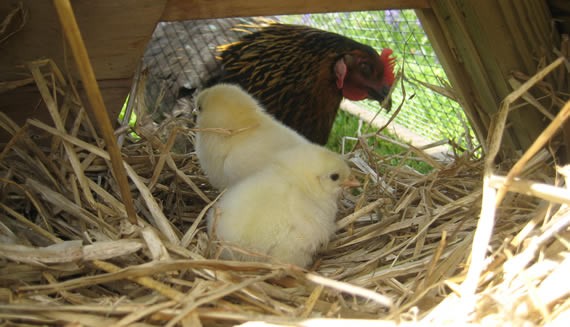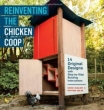Breeding Poultry
We decided in 2007 to try to rear some chicks for the first time. The idea was that any females would go into the layer flock and any males on to the table.
There are lots of books about hatching eggs and rearing chickens. Katie Thear's "Incubation: A Guide to Hatching and Rearing" was the one we used as reference.
Once you have some experience with hens, you may decide to hatch some chicks. To do so, you will need fertile eggs and either an incubator or a broody hen. If you don’t have a broody hen, you will also need a heat lamp and suitable accommodation for the chicks after they hatch.
You can either buy fertilised eggs or you can run a cockerel with your own hens. If you run a cockerel, you cannot legally sell the eggs for consumption. In either case, you won’t know if the eggs are fertile until about ten days into the incubation period, when you can candle them. Candling eggs involves shining a light, say from a small torch, through the egg, bottom to top. If the egg is fertile, by 10 days, you will be able to see the embryo chick developing.
Keeping a cockerel in a built-up area is not recommended - cockerels really are noisy and they're noisy all day, not just at sunrise. Buying fertilised eggs isn’t a sure-fire way of getting chicks either; if you can source them locally, it’s preferable to getting them through the post. Being tossed around by the postie and his mates doesn’t seem to help hatching rates.
The commercial hybrids are selected for non-broodiness; however, we have had Black Rocks go broody and sit successfully. Pure traditional breeds are more likely to go broody, bantams and Silkies even more so. Reputedly, one of the best broodies is a Silkie x Light Sussex. Other breeds that have a greater tendency to go broody are Wyandottes, Sussex, Orpingtons and Plymouth Rocks.
 A broody Black Rock hatched these chicks
A broody Black Rock hatched these chicks
Remember, if you decide to hatch eggs by either means, you will almost certainly get cockerels. There is no great market for cockerels, so you must be clear in your own head (and heart) before you start about what you are going to do with the male birds. You must not expect others to take on this responsibility for you. The livery stables that I used to use had a flock of unwanted cockerels that had been dumped there; fortunately, the yard owner was prepared to tolerate them and some of the horse owners fed them but these were lucky birds.
- Previous « Selling eggs
- Next Hatching eggs and rearing chicks »

About Rosemary Champion
Rosemary lives on a 12 acre smallholding in Angus, in the east of Scotland, where she keeps Ryeland Sheep, Shetland cattle and assorted poultry. She was destined to be a smallholder from an early age.
Further Reading
 Chicken & Eggs: River Cottage Handbook No.11 Mark Diacono |  Storey's Guide to Raising Chickens Gail Damerow |  A Beginners Guide to Caring for Ex-Batts Jo Barlow |  Reinventing the Chicken Coop Matthew Wolpe |  Chickens: The Essential Guide to Choosing and Keeping Happy, Healthy Hens Suzie Baldwin |
Smallholding shop
When you click links below and make a purchase, this may result in this site earning a commission from eBay.

Poultry Shield 5L
Poultry shield is a… from £17.55 + p&p

Plastic Poultry Feeder 3kg
Super Feeder Hoppers. Capacity… from £6.40 + p&p

Liquid Life Guard 250ml
100% Natural Plant Based… from £12.88 + p&p

No 5 Poultry Fountain Drinker 4.5li
Eltex Poultry Fountain… from £35.12 + p&p
















